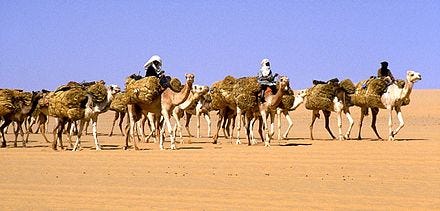Today I’m focusing on journeys, travels and major life changes. Life’s journey begins with birth and two writers are remembered today. The poet W.B. Yeats was born in 1865 and the crime novelist Dorothy L. Sayers in 1893. Tom King the MP was born in 1933. He was MP for the town Bridgwater, Somerset for all the time I lived and worked there. He was one of those rare things, a hard working constituency MP who represented everyone, whether they were Conservative as he was, Labour, Liberal Democrat or independent. He was one of the favourites to succeed Margaret Thatcher but he didn’t run. The thing I like most about him is the name he chose when he was made a peer: Baron King of Bridgwater. Baron King! I’m sure he chose it with a smile on his face.
Love and marriage are a second key stages on life’s journey. In 1525 Martin Luther married Katharina von Bora. He was an ex-monk, she an ex-nun. A match made in heaven perhaps.
Not quite on this day but near enough, the writer James Joyce and Nora Barnacle had their first date on 16 June 1904 which he chose as the day for the events of his masterpiece, Ulysses. His father said about her that with a name like Barnacle she’d stick with him. And she did. They got married in 1931 and were hounded by the paparazzi of the day (there’s nothing new.) The day is celebrated across the world as Bloomsday and I’m going to Monaco tomorrow to take part in the Princess Grace Irish Library celebrations and raise a glass to James and Nora.
And then there’s death. One of the deadliest air raids on London took place in 1917, resulting in 162 deaths. A quarter of a century later, in 1944, the first V1 Flying Bomb hit London, killing six people.
But today I’m writing about the remarkable travels of Ibn Battuta, a Berber legal scholar from Tangier. In 1325 at the age of 21 he travelled in a caravan on his first Hajj to Mecca. He got a little distracted en-route – he didn’t return for 24 years.
Sorry - wrong sort of caravan.
He is said to have travelled 117,000 kilometres or 73,000 miles. The Chinese admiral Zheng He voyaged 50,000 km or 31,000 miles. Many people in the west believe that Marco Polo was the greatest medieval traveller but he was a laggard in comparison, only managing 24,000 km or 15,000 miles. And neither Zheng He nor Marco Polo travelled as widely as Ibn Battuta who visited three continents. He only missed the Americas and Australasia.
He visited much of the Muslim world and in most places he probably only needed to speak Arabic. He claimed to have been to the following places – I’m giving their modern, western names:
Morocco, Tunisia, Algeria, Libya, Egypt, Palestine, Israel, Lebanon, Jordan, Syria, Turkey, Saudi Arabia, Yemen, Oman, Bahrain, Iraq, Iran, Susan, Somalia, Kenya, Tanzania, Ukraine, Russia, Kazakhstan, Turkmenistan, Uzbekistan, Afghanistan, Pakistan, India, Sri Lanka, the Maldives, Bangladesh, Indonesia, China, Niger, Mauretania, Mali, Italy, Gibraltar and Constantinople which was then part of the Byzantine Empire.
Some scholars suggest that he didn’t go to every last place he claimed. But who can be sure? He certainly didn’t go to northern Europe, maybe the weather put him off.
He met Emirs, Sultans, Mongol Khans, the Emperor of Byzantium and any number of tribal chieftains, religious figures and mystics. He suffered ship wrecks, attacks by pirates and was kidnapped and robbed by brigands.
He became a trusted adviser to the Sultan of Delhi who bore the nickname of The Mad Sultan and the Wise Fool – suffice it to say that the sultan often accused him of treason. He stayed with the sultan for six years, perhaps because he gave extremely valuable gifts to prove his high status.
Ibn Battuta took his duties as a judge seriously. Men who did not attend Friday prayers where whipped and robbers’ right hands cut off. (Presumably he was still annoyed at being kidnapped and robbed.) He also stopped the tradition of women going topless in public. He was not the most popular of judges and wisely resigned before the sultan dispensed with him.
Throughout his travels, Ibn Battuta kept close company with women. He had several female Greek slaves and usually took a wife when he stopped anywhere for a time, divorcing her when he moved on. While in the Maldives, he married four women, saying that their small dowries made marriage a convenient arrangement for any visitors. Designed for the likes of him, in fact.
At one city in China, he was welcomed by the local equivalent of a brass band. He claimed to be the ambassador of the Sultan of Delhi which would, no doubt, have made the sultan really mad. He decided to return home, but with bad timing arrived in Syria just as the Black Death struck. He reached Tangier to find out his mother and father had died.
He was certainly not a home lover for he left the city days after arriving in Tangier, going to help defend Gibraltar against the king of Castile and Leon. Fortunately for him, the war was called off as the king had died of plague.
Our hero then took a caravan across the Sahara as far south as Timbuktu and was summoned home by the Sultan of Morocco, arriving there in 1354.
Right sort of caravan.
Ibn Battuta wrote an account of his astonishing travels. Some scholars think that much of it may be fabricated, culled from the accounts of other travellers. Others, however, believe that much is a true account. Tim Macintosh-Smith has written the following books about him: Travels with a Tangerine (2001), The Hall of a Thousand Columns (2005) and Landfalls (2010).
Ibn Battuta died in 1569 at the ripe old age of 65.






